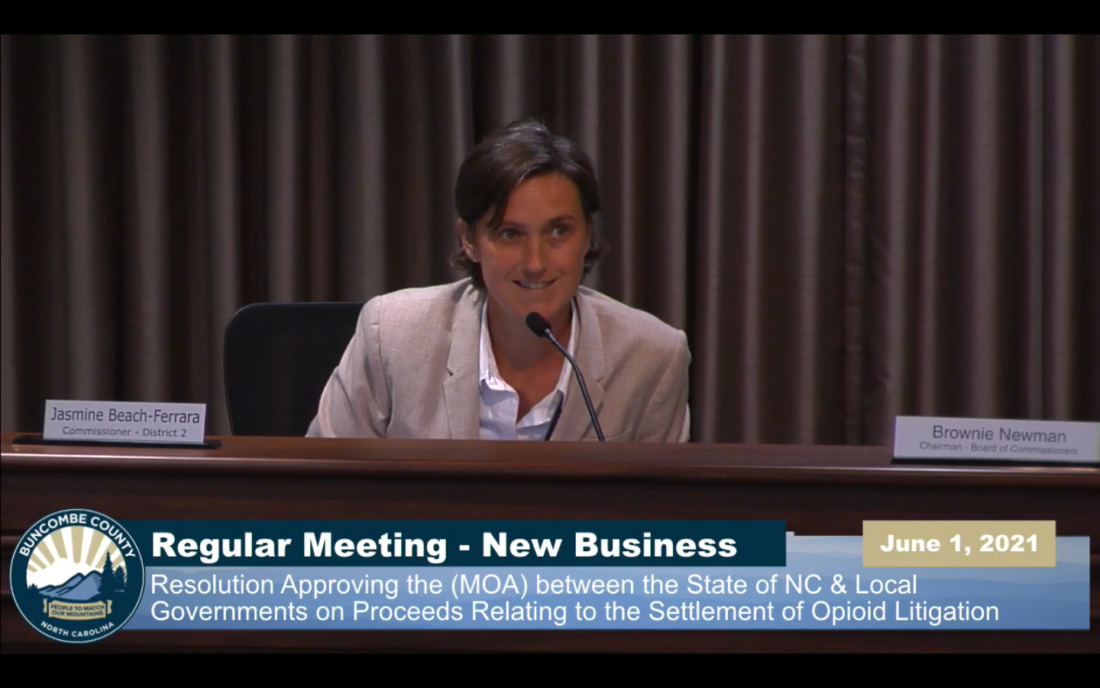The wheels of justice set in motion by Buncombe County nearly four years ago may now be close to delivering over $21 million to county coffers. During a June 1 meeting, the county Board of Commissioners voted unanimously to approve a memorandum of agreement regarding the settlement of its litigation against pharmaceutical companies for their role in the opioid crisis.
Buncombe was the first county in the state to file suit against those companies, noted senior staff attorney Michael Frue in a presentation to the board, having done so in November 2017. Since then, 75 other counties and eight municipalities across North Carolina have filed similar litigation, along with thousands of other local governments across the United States.
Those cases have been combined into a sprawling “multidistrict litigation” at the national level, Frue explained, which is close to reaching an overall settlement of roughly $26 billion. By signing the memorandum, he said, Buncombe and other local jurisdictions would simplify how approximately $2 billion in attorneys’ fees would be awarded and speed up receipt of the remaining money. As of June 1, 19 North Carolina counties had approved the agreement, he told the board.
Commissioner Jasmine Beach-Ferrara, who served on a state committee tasked with developing the memorandum, said the money could only be spent on certain programs to fight the opioid epidemic — nearly all of which Buncombe currently has in place. “Once the settlement is reached and the funds start moving, they’ll be able to go to work that’s already underway and helping people get the treatment they need and begin rebuilding their lives and their families,” she said.
The funds would be released over 18 years, Frue said, but many details of the settlement remain sealed at the federal court level. He did not provide an estimate for how much funding would be made available immediately after the litigation concluded.
In other news
Commissioners decided to postpone their vote on the county’s fiscal year 2021-22 budget until Tuesday, June 15. By reinstituting a waiting period between the June 1 public hearing on the budget and the vote, the board returns to its historical practice; last year, the vote took place immediately after the hearing’s conclusion.
Only three people spoke during the public hearing. Asheville resident David Greenson expressed concern about potential inequities in Buncombe’s property taxes, noting that property values have increased disproportionately more for low-income homeowners than for the wealthy. Vicki Meath, the executive director of Asheville-based nonprofit Just Economics, suggested that the county should do more to support transit services.
And Keeley Knopp, a member of the county’s Library Advisory Board, asked the commissioners to allocate specific money toward educational library programming such as children’s storytimes and adult book clubs. Commissioner Amanda Edwards noted that $55,000 had been designated for that purpose in the proposed budget.
An executive summary of the budget is available at avl.mx/9hb, and an interactive online budget explorer with detailed line-item spending is available at avl.mx/9hc.




Before you comment
The comments section is here to provide a platform for civil dialogue on the issues we face together as a local community. Xpress is committed to offering this platform for all voices, but when the tone of the discussion gets nasty or strays off topic, we believe many people choose not to participate. Xpress editors are determined to moderate comments to ensure a constructive interchange is maintained. All comments judged not to be in keeping with the spirit of civil discourse will be removed and repeat violators will be banned. See here for our terms of service. Thank you for being part of this effort to promote respectful discussion.